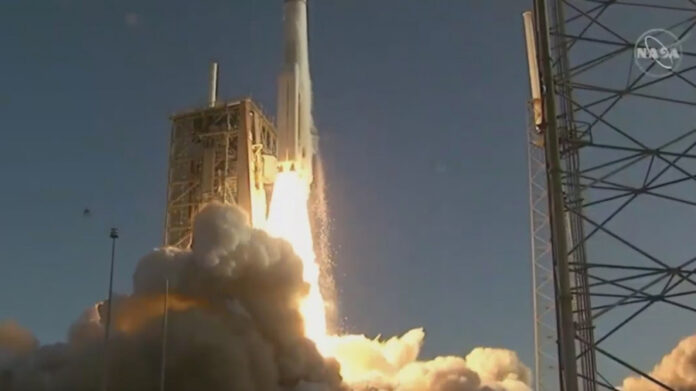CAPE CANAVERAL, Fla. (WFLA) – Are we really alone in the Universe?
NASA is moving closer and closer to answering the age-old question.
The space agency just launched its latest and most-advanced Mars rover from Cape Canaveral, Florida on Thursday.
The $2.4 billion rover, known as Perseverance will land on the Red Planet in February, then spend about two years searching for evidence of life.
The rover lifted off at 7:50 a.m. Thursday atop the United Launch Alliance’s Atlas V rocket. Also on board: an $80 million experimental helicopter named Ingenuity, which would be the first chopper to fly on another planet.
The launch was carefully timed for when Earth and Mars are in alignment, which happens every 26 months.
Successful staging and ignition of the Centaur upper stage is confirmed! The vehicle now weighs a little more than five percent of its liftoff mass. https://t.co/iq4oKMrMuA
— ULA (@ulalaunch) July 30, 2020
The 502nd RL10 engine is performing well with good operating parameters reported. This first burn by Centaur will last seven minutes to place the vehicle into a preliminary parking orbit around the Earth.
— ULA (@ulalaunch) July 30, 2020
The Centaur continues firing to obtain orbital velocity, burning liquid hydrogen and liquid oxygen propellants. Telemetry from the rocket is being routed through NASA’s orbiting Tracking and Data Relay Satellite System.
— ULA (@ulalaunch) July 30, 2020
The first main engine cutoff, or MECO-1, is confirmed for the #AtlasV rocket’s Centaur upper stage. A half-hour coast is underway before the Earth escape burn begins. https://t.co/iq4oKMrMuA
— ULA (@ulalaunch) July 30, 2020
Perseverance will land on Mars’ Jezero Crater a little after 3:40 p.m. EST on Feb. 18. Then it will spend two years exploring an ancient river delta, which could contain evidence of past life.
Scientists estimate the rivers that built the delta flowed over 3.5 billion years ago when life may have flourished on the Red Planet.
The rover’s 20 cameras and other scientific instruments will be used to search for “biosignatures” of primitive life and drill into Mars to collect rock and soil samples for labs on Earth. It will also have two microphones that will capture audio from its landing and explorations.
“Perseverance is going to drill and prepare samples for return and cache them on the surface of Mars,” Lori Glaze, director of planetary science at NASA Headquarters told CBS News. “In 2026, a fetch rover will be launched to collect those samples and bring them to a rocket that will launch them into orbit around Mars. Another orbiter will rendezvous and capture those samples for safe delivery to Earth.”
If all goes as planned, the samples should arrive to labs on Earth by 2031.
Live coverage of the launch, hosted by WFLA Now’s J.B. Biunno and Max Defender 8’s Amanda Holly started at 7 a.m.
You can watch their continued coverage on WFLA.com and the WFLA Facebook page.
LATEST STORIES:














